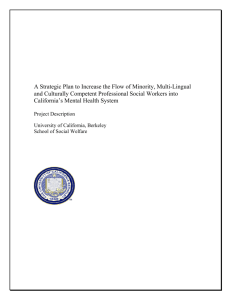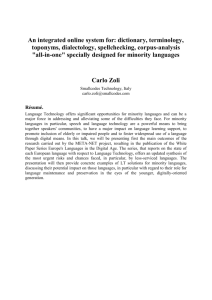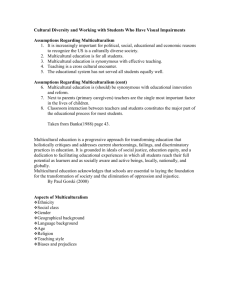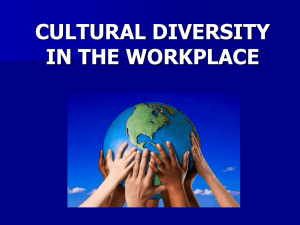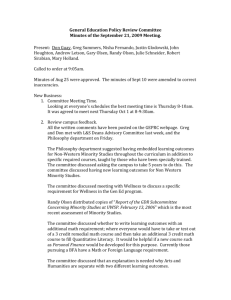Cultural Competency - Reclaiming Futures
advertisement
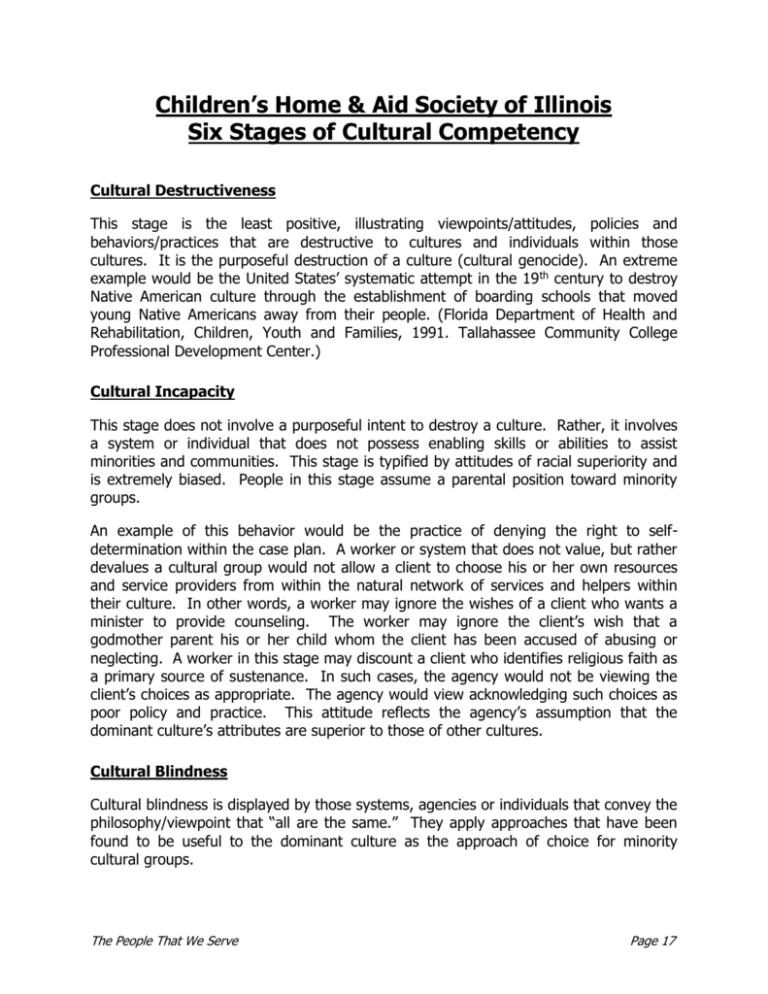
Children’s Home & Aid Society of Illinois Six Stages of Cultural Competency Cultural Destructiveness This stage is the least positive, illustrating viewpoints/attitudes, policies and behaviors/practices that are destructive to cultures and individuals within those cultures. It is the purposeful destruction of a culture (cultural genocide). An extreme example would be the United States’ systematic attempt in the 19 th century to destroy Native American culture through the establishment of boarding schools that moved young Native Americans away from their people. (Florida Department of Health and Rehabilitation, Children, Youth and Families, 1991. Tallahassee Community College Professional Development Center.) Cultural Incapacity This stage does not involve a purposeful intent to destroy a culture. Rather, it involves a system or individual that does not possess enabling skills or abilities to assist minorities and communities. This stage is typified by attitudes of racial superiority and is extremely biased. People in this stage assume a parental position toward minority groups. An example of this behavior would be the practice of denying the right to selfdetermination within the case plan. A worker or system that does not value, but rather devalues a cultural group would not allow a client to choose his or her own resources and service providers from within the natural network of services and helpers within their culture. In other words, a worker may ignore the wishes of a client who wants a minister to provide counseling. The worker may ignore the client’s wish that a godmother parent his or her child whom the client has been accused of abusing or neglecting. A worker in this stage may discount a client who identifies religious faith as a primary source of sustenance. In such cases, the agency would not be viewing the client’s choices as appropriate. The agency would view acknowledging such choices as poor policy and practice. This attitude reflects the agency’s assumption that the dominant culture’s attributes are superior to those of other cultures. Cultural Blindness Cultural blindness is displayed by those systems, agencies or individuals that convey the philosophy/viewpoint that “all are the same.” They apply approaches that have been found to be useful to the dominant culture as the approach of choice for minority cultural groups. The People That We Serve Page 17 While this is a mid-level stage in the continuum of cultural competence, it is still lacking attitudes, behavior and policies that take into account the diversity of the client population. Also, this attitude does not recognize strengths inherent within minority cultures. A system, agency or individual at this level of cultural competence would not appreciate differences. They would be unable to recognize and employ the resources that are a natural part of the client’s culture. For instance, a culturally blind system would not recognize the value of non-kinship placements for children of color. However, informal adoption and foster care is common in African-American and Hispanic families. Cultural Pre-Competence This stage’s title implies movement. Agencies, systems and individuals in this stage are able to recognize and clearly identify their deficits and areas of need in delivering effective services to minority clients and communities. The prevailing attitude in this stage is “How can we improve services to a specific population such as the African-American population”? Practices involve the hiring of minorities, training of staff in cultural sensitivity, developing strategies for working effectively with minority communities and recruiting minority individuals for membership on boards and advisory committees. The identified dangers at this stage are: 1. An erroneous assumption that accomplishment of one goal fulfills responsibility to minority communities. 2. Failure to accomplish a goal may result in a hesitancy to try again. 3. A tendency toward tokenism. Tokenism is a modest or paltry gesture made in the direction of cultural sensitivity. An example of tokenism is an agency staff that includes only one or two minority workers. Other examples include appointing a minority representative to one advisory committee or identifying one minority worker for promotion to management. Cultural Competence Cultural competence is reflected in individuals, agencies and systems that accept and respect differences and are involved in ongoing cultural self-assessments. Competence is exemplified in individuals, agencies and systems that are attentive to the dynamics of difference and that continue to expand cultural knowledge, resources and strategies to better meet the needs of minority communities. The People That We Serve Page 18 Cultural competence is evident when minority groups are viewed as being distinctly different. Culturally competent people also recognize diversity within each culture, which results in sub-groups with identified strengths and distinguishable cultural characteristics. Thus, the culturally competent worker would not view AfricanAmericans as being “monolithic” or all the same. Culturally competent agencies hire non-biased staff, seek advice and consultation from minority communities and have identified their strengths and needs relative to service delivery within minority communities. These agencies provide support to staff in acquiring the skills necessary for working effectively in cross-cultural situations. The policies of the culturally competent agency reflect the attitude of respect for difference, and the agency is committed to policies that will enhance service delivery to diverse groups. Cultural Proficiency Cultural proficiency is the most advanced stage of cultural competence. Cultural proficiency is reflected in systems, agencies and individuals that hold culture in high esteem. The behavior practice at this stage involves ongoing research and investigation of new therapeutic approaches based on culture. A culturally proficient agency will hire at least one worker or supervisor who is an expert in the field of culturally competent practice and who can disseminate cultural competence throughout the agency. Culturally proficient agencies are always finding new strategies for higher levels of culturally competent care. Culturally proficient agencies constantly expand their knowledge base and readily seek new information that will aid them in being culturally sensitive when working with minority communities. Agencies and individuals advocate for cultural competence throughout the system and the broader society. (Taken from the E.F. Ghoughan and Associates, Inc. literature) The People That We Serve Page 19 The People That We Serve Page 20
